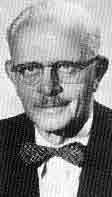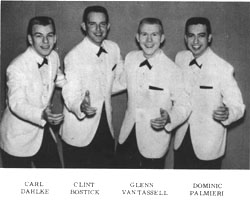


"The Michigan Troubadour in its February-March 1961 issue, featured an article written by Duane H. Mosier, who was then the district historian, about Dr. F. Dudleigh Vernor. The story was about the birth of a song. The song was "The Sweetheart of Sigma Chi," written approximately 1911-1912 by Dr. Vernor, a native Detroiter, while a student at Albion College. He joined the Sigma Chi fraternity, and during his second year he formed a friendship with one of his fraternity brothers, Byron Stokes, who had a talent for writing both prose and poetry. One day Stokes had a dream about his ideal girl and struck off the words of the "Sweetheart" song. He handed the words to his musician friend. As Vernor related: "While practicing one day I put the words of the song before me and within an hour I had written down the melodic line of the song.
"It was sung around the local chapter for a while, even becoming known around the entire campus. So many people wanted copies of the song that my brother Dick arranged to have 500 copies printed which we sold for 25 cents per copy. Soon we found we were having the copies printed by the thousands. In time it got out of hand for us and we sold the song on a royalty basis to the Melrose Publishing Company of New York who have published the song ever since." Dr. Vernor was the organist for the First Methodist Church in Jackson, Michigan, for twelve years, moving later to the Metropolitan Methodist Church in Detroit. Whenever boon-dogglers get together and harmonize on "The blue of her eyes and the gold of her hair," they can give Dr. Vernor a silent `thank you' for giving to us barbershoppers a melodious song we like to sing.
"At the Michigan District Board of Director's meeting held in Marshall on January 7, 1961, the district budget for 1961 was approved for $3200, based on an approximate district membership of 1700. The general fund was reported at $6,443.92 with a chorus and quartet travel fund of $696.21. These figures are offered only for comparison to today's budget, which runs in the neighborhood of approximately $11,000 with a membership of approximately 1350.
"Many historic events took place worldwide in 1961. John F. Kennedy was inaugurated as our 35th President, Alan Shephard Jr. became the first American in space, and Gary Cooper died at the age of 60. In the Michigan District, the local chapters were all involved in producing their successful chapter shows with notable quartets from throughout the Society. The Boyne City Chapter was considering changing their "Bush League" contest format due to the increased number of entries. They were worried that the show would be overlong, and were considering holding an elimination contest in the afternoon. This is close to the format that they are using today, except that the contest is held in the afternoon and the top two quartets generally perform on their night show on the same day.
Roscoe Bennett resigns as Troubadour editor
"The resignation of Roscoe Bennett as the editor of the Michigan Troubadour after publishing the February-March issue caused considerable consternation throughout the district. The search for a new editor was long and trying, and the loss of communication in the district during this period proved detrimental to district officers trying to explain some very extensive changes at the international level which affected district members and chapters. Finally, in November of 1961, James O. Davenport took over as the editor. He changed the format from a newspaper type layout to a magazine, publishing every month except during June and July. Roscoe had served the district well during his tenure as the editor of the Troubadour, probably (because he was a professional newspaper man) editing and publishing the most professional, newsy publication ever known in the Society. In fact, his prolific reporting of international items during the middle Fifties caused other districts to complain because they felt that the Troubadour was scooping the other district publications and even the Harmonizer on important changes at international. We are sure the proximity to the international headquarters which was located in Detroit at that time had a lot to do with this professional jealousy. "The reporting on the international preliminaries held in Muskegon April 28-30, 1961, was very sparse due to the lack of a district publication. It was known that Rudy Hart, the international treasurer and famed director of the Michigan City, Indiana, chorus, was the master of ceremonies at the finals. The room rates announced by Chairman Halley Dion at the Occidental Hotel in Muskegon were listed as $4.75 to $6 for a single, $6.25 to $8.50 for a double, and $12.50 to $30 for suites. It's sometimes kind of interesting to compare these rates with today's rates. "We do know that the Michigan District qualified three quartets to compete in Philadelphia from that contest, those being the AUTO TOWNERS (Dominic Palmieri, tenor; Glenn Van Tassell, lead; Carl Dahlke, bass, and Clint Bostick, baritone); the AIRE-MALES (Dale Clixby, bari; Roger Craig, bass; Tom Pollard, lead, and Bill Wilcox, bass); and the CHORDUROYS (Bernie Smith, lead; Marv McClary, bass; John Wearing, tenor, and Mel Holderness, bari). "The Muskegon PORT CITY Chorus, under the direction of Al Burgess, was selected to represent the district in the chorus contest at Philadelphia. They ended up with a fine fourth place medal, the highest finish of any Michigan chorus in international chorus competition other than Grand Rapids's big win in 1953. "While the SUN TONES were declared the international quartet champions in Philadelphia in 1961, the AUTO TOWNERS, representing the Michigan District, finished in a fine 16th place in their first international appearance. Our other two representatives, the AIRE-MALES and the CHORDUROYS, finished 27th and 41st, respectively.

Roscoe D. Bennett

Auto Towners
"The keynote speaker to the 23rd international convention was none other than Joe Jones, a long-time member who had an illustrious barbershop career which began in Detroit in the early days of radio at WAGM. There he was known as the "The Smiling Baritone." Later he sang with the STROLLERS who became fixtures on an early radio show, "The Red Apple Club" on WCX. The STROLLERS were charter members of the Oakland County, Michigan Chapter. Jones served as president in 1943. He had competed in international contests through the years, finishing in the top 15 as bari of the AMBASSADORS in the 1944 contest in Detroit. In 1945 he helped Sigmund Spaeth and Geoffrey O'Hara organize the Manhattan, New York Chapter, serving as that chapter's president in 1950. He returned to Detroit in 1951. He was best known, perhaps, for his tireless efforts on behalf of the International Contest and Judging Committee, where he served several terms as chairman of this important Society committee.
Adoption of Long-Range Planning Committee plan"The International Board made some news affecting the Society by adopting the report of the Long-Range Planning Committee. The committee, after many long and tedious hours of discussion, recommended the establishment of additional international staff members as follows: 1. A Coordinator of Musical Activities; 2. A Society Events Manager; and, 3. A Harmonizer and Public Relations Director. In addition to the above, it was felt that one field man should be assigned to a specified district as a full-time qualified administrator (as a pilot project) to be responsible for promoting sound, efficient administrative and operating practices at these levels. To finance all of the above, it was necessary to raise international dues from $5.50 to $8.25, stirring such a ruckus among many Michigan District members at that time, to no avail, of course.
Jackson hosted October fall convention"The fall convention was held in Jackson, Michigan, on October 6-8, 1961. In the district quartet contest, the AUTO TOWNERS from the Detroit and Dearborn Chapters were declared the district quartet champions for 1962. Second place went to the CURBSTONE SERENADERS from Oakland County and Pontiac. Other quartets competing included the STATELINERS from Niles-Buchanan in third, the CHORDUROYS from Oakland County fourth. The INSOMNIACS from South Haven were declared the junior champions with the VOCAL CHORDERS from Windsor winning the novice crown.
Motor City 1961
|
"In the chorus international preliminary contest, the Niles-Buchanan GATEWAY Chorus, under the direction of Barden Borst, was selected to represent the district at the 1962 contest to be held in Kansas City, Missouri. At this same contest, the Detroit MOTOR CITY Chorus was declared the Michigan District champions. Second place went to the Muskegon PORT CITY Chorus, third to the Dearborn CHORD-O-MATICS, and the Kalamazoo MALL CITY Chorus winning the junior championship.
"At the annual House of Delegates meeting held on Sunday morning, October 8, 1961, 1962 officers elected included William Hansen, president, Duncan Hannah, E.A. VandeZande, Al Burgess, and Bob Tracy, zone vice presidents, John Klaiber, treasurer, and Lou Harrington, secretary. Chase Sanborn, of the Pontiac Chapter, assumed the international board member position for 1962 after having been elected at the International Board meeting held in Philadelphia.
First Annual Harmony Education Program Summer School held"One event that occurred which bears mentioning here was the First Annual Harmony Education Program Summer School which was held at St. Mary's College in Winona, Minnesota, August 24-27, 1961. This first HEP school, attended by many Michigan members, was headed by Rudy Hart, and included a faculty of such Society greats as Bob Johnson, Bill Diekema, Maurice "Molly" Regan, John Peterson, and Joe and Paul Schmitt (of the SCHMITT BROTHERS quartet). This HEP school was actually the forerunner of our Harmony College which is held today so successfully in St. Joseph, Missouri, at Western Missouri State College. It also spawned the idea for Michigan's first mini-HEP school which started in 1962.
"Despite that fact that the Berlin Wall was erected that year between East and West Berlin, and Chubby Checkers had introduced the "Twist" to the American dance scene, barbershopping continued to grow and prosper in Michigan during 1961.
| [index] | [1961] | [1962] | [1963] | [1964] | [1965] | [Contents] |